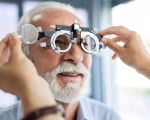Trusted Professionals for Managing Age-Related Macular Degeneration: A Comprehensive Guide
- Understanding Age-Related Macular Degeneration (AMD)
- Why You Need Trusted Professionals for AMD
- Finding the Right Professionals for Managing AMD
- How Trusted Professionals Help with AMD Treatment
When it comes to managing AMD, seeking help from trusted professionals is essential for slowing the progression of the disease and preserving vision. AMD is a complex condition that requires a personalized treatment approach. Optometrists, ophthalmologists, and retinal specialists are trained to diagnose and manage AMD, providing patients with the best chance to maintain their quality of life. Trusted professionals not only help with treatment but also offer support and guidance on lifestyle changes that can complement medical interventions.
1. Expertise in Diagnosis
One of the primary reasons to consult trusted professionals for AMD is their ability to provide an accurate diagnosis. While symptoms of AMD can be subtle in the early stages, a comprehensive eye examination can reveal signs of the condition. Retinal specialists are particularly skilled at detecting both dry and wet AMD, using advanced imaging technologies like optical coherence tomography (OCT) and fluorescein angiography to examine the retina and macula in great detail.
2. Access to the Latest Treatments
Ophthalmologists and retinal specialists stay up to date on the latest treatment options for AMD, from FDA-approved medications for wet AMD to lifestyle recommendations for managing dry AMD. Treatments such as anti-VEGF injections and laser therapy can help slow the progression of wet AMD and prevent further vision loss. Dry AMD may not have the same immediate treatment options, but professional guidance on nutritional supplements, like those containing lutein and zeaxanthin, can support retinal health.
3. Ongoing Monitoring and Support
AMD is a progressive disease, and ongoing monitoring is crucial for managing the condition effectively. Trusted professionals can track the progression of AMD through regular eye exams, providing early intervention if the disease worsens. Regular check-ups allow doctors to make timely adjustments to the treatment plan, ensuring the best possible outcome for the patient.
Finding the right professionals to manage AMD requires research and a proactive approach. Here are some key factors to consider when looking for an eye care professional to help with AMD:
1. Choose an Ophthalmologist or Retinal Specialist
While optometrists are excellent for general eye care, retinal specialists or ophthalmologists are the most qualified to treat AMD. These professionals have specialized training in diagnosing and managing retinal diseases and are often the ones who offer advanced treatments like injections for wet AMD. Choosing a professional with experience in managing AMD is crucial for receiving the best care.
2. Look for Experience and Credentials
When selecting a trusted professional, make sure they have the appropriate certifications and experience in treating AMD. Ophthalmologists and retinal specialists should be board-certified and have a proven track record of successfully managing AMD cases. It's also important to ask about their experience with the latest treatments and diagnostic technologies, as this can make a significant difference in the outcome of your treatment.
3. Consider Referrals and Reviews
One of the best ways to find trusted professionals for AMD is through referrals. Ask your primary care physician, family, or friends for recommendations. Additionally, online reviews and patient testimonials can provide insight into a professional's reputation and the quality of care they offer. Researching a specialist’s background and patient satisfaction can help you make an informed decision.
Trusted professionals play a key role in helping individuals with AMD manage their condition and maintain their vision. Here’s how they can assist with treatment:
1. Providing Medical Treatment and Procedures
For those with wet AMD, trusted professionals may recommend treatments like anti-VEGF injections, which can help reduce abnormal blood vessel growth in the retina. Laser therapies and photodynamic therapy may also be options to control the condition. For dry AMD, professionals may suggest vitamins and lifestyle changes to slow progression and manage symptoms.
2. Offering Lifestyle and Dietary Advice
In addition to medical treatments, trusted professionals often provide advice on lifestyle changes that can support eye health. A healthy diet rich in antioxidants, omega-3 fatty acids, and vitamins like C and E can play a significant role in managing AMD. Regular exercise, maintaining a healthy weight, and protecting your eyes from UV rays can also help reduce the risk of further vision loss.
3. Providing Support and Education
Managing a condition like AMD can be emotionally challenging. Trusted professionals offer not only medical care but also emotional support and education about the disease. They can help patients understand their condition, explore treatment options, and provide resources for coping with vision loss. Professionals can also connect patients with support groups and vision rehabilitation services to help them adapt to changes in their vision.
If you're looking for trusted professionals to manage your AMD, Eye Docs can help connect you with the right experts and provide you with the resources you need for the best possible care.








